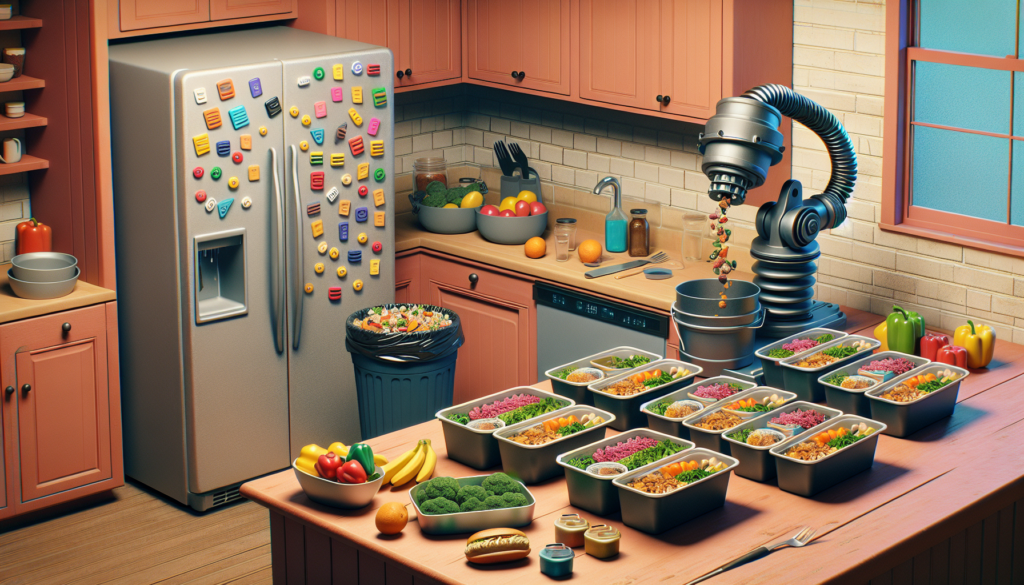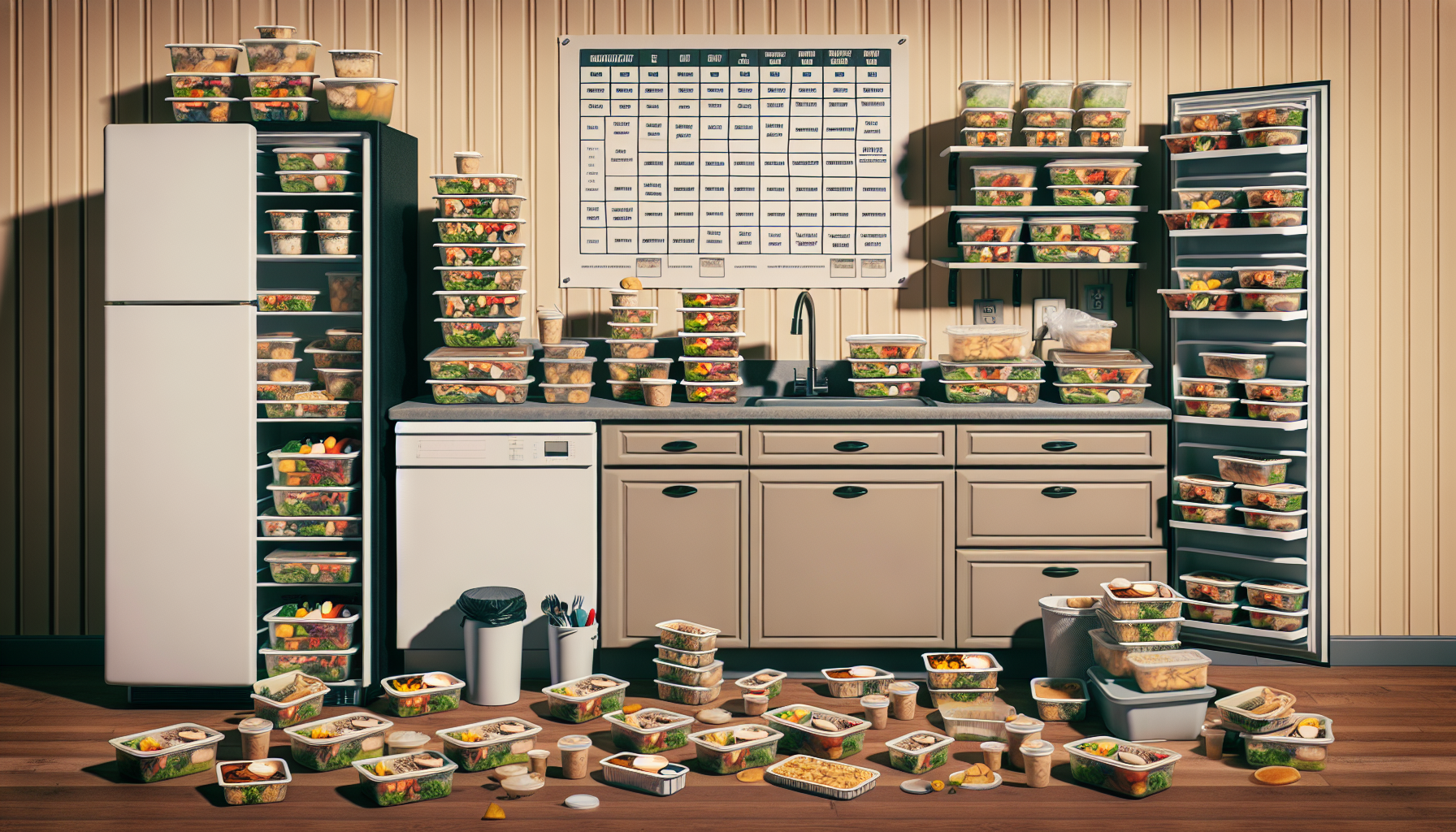You’ve probably heard all about the benefits of meal prepping – how it can save you time, money, and help you stick to your health goals. But have you ever wondered about the downsides? In this article, we’ll explore the potential negatives of meal prep. From taste fatigue to limited variety, we’ll take a closer look at what might make this seemingly perfect strategy for meal planning not so perfect after all. So, if you’re thinking about jumping on the meal prep bandwagon, keep reading to make sure you’re aware of the cons before you make a commitment.
Expense
Cost of ingredients
When it comes to meal prepping, one of the drawbacks is the cost of ingredients. Purchasing fresh produce, lean meats, and other healthy ingredients can add up quickly, especially if you are preparing meals for the entire week. Oftentimes, it may be more cost-effective to buy smaller quantities of ingredients as you need them.
Equipment costs
Another expense to consider is the cost of meal prep equipment. Investing in quality meal prep containers, knives, cutting boards, and other kitchen tools can be quite costly. While these items are important for efficient meal prep, they can add up and strain your budget.
Time costs
While meal prepping is meant to save you time during the week, it does require a significant time investment upfront. Planning your meals, grocery shopping, chopping vegetables, and cooking multiple dishes can easily take up several hours. This may be challenging for individuals with busy schedules or those who prefer to spend their free time on other activities.
Monotony
Limited food choices
One of the main drawbacks of meal prepping is the limited food choices it often entails. To ensure that your meals remain fresh and high-quality throughout the week, it is common to stick to simple recipes and avoid ingredients that may not hold up well over time. This can lead to eating the same meals repeatedly, which may become monotonous and less enjoyable over time.
Loss of spontaneity
Meal prepping often involves planning your meals in advance and sticking to a set menu. While this may be beneficial for staying on track with your nutrition goals, it can also result in a loss of spontaneity. You may find yourself missing the excitement of trying new recipes or dining out on a whim.
Lack of variety
Related to the limited food choices, meal prepping can also lead to a lack of variety in your diet. When you are preparing meals ahead of time and portioning them out, it may be challenging to incorporate a wide range of flavors, textures, and cuisines into your meals. This can leave you craving for new taste experiences and feeling unsatisfied with your meal choices.

Storage Issues
Limited refrigerator space
One practical concern with meal prepping is the limited refrigerator space it requires. When you are preparing multiple portions of meals in advance, it can be challenging to find enough space in your fridge to store everything. This can lead to overcrowded shelves and difficulty storing other perishable items.
Meal planning constraints
Meal prepping also requires careful meal planning to ensure that your meals remain fresh throughout the week. This means taking into consideration the perishability of ingredients and how long they can safely be stored. It can be challenging to balance variety, taste, and meal longevity when planning and storing your meals.
Perishability
While meal prepping can extend the lifespan of your meals, it is important to consider the perishability of certain ingredients. Fresh leafy greens, delicate herbs, and certain proteins may not hold up well over time, resulting in a loss of quality and potential food waste. It is crucial to choose ingredients that can withstand the storage time required for meal prepping.
Taste and Texture
Food becomes dry and bland
One downside to meal prepping is that the food can often become dry and bland by the time you are ready to eat it. Reheating pre-portioned meals can lead to a loss of moisture and result in less appetizing dishes. Sauces and dressings may also separate or become absorbed into the ingredients, further affecting the overall taste and texture.
Loss of flavor and appeal
Over time, meal prepping may result in a loss of flavor and appeal in your meals. Freshly cooked ingredients typically offer vibrant colors, flavors, and aromas, which can diminish after being stored for several days. This can make your meals less enjoyable and reduce the overall satisfaction of your eating experience.
Texture changes
Some ingredients, such as crisp vegetables or tender meats, may experience texture changes after being refrigerated and reheated. These changes can lead to a less enjoyable eating experience, as the desired crunch or tenderness may be lost. Meal prepping may therefore sacrifice the desired texture and mouthfeel of certain ingredients.

Time and Effort
Preparation takes time
While meal prepping can save time during the week, it is important to acknowledge the significant time and effort required for the initial meal preparation. From planning your meals to grocery shopping and cooking, there is a considerable upfront investment of time. This may be challenging for individuals with busy schedules or those who prefer more flexible meal options.
Clean-up and maintenance
Meal prepping often involves cooking large quantities of food at once, resulting in more dishes and utensils to clean. The added clean-up and maintenance can be time-consuming and may feel overwhelming, especially after a long day. It is important to consider the extra effort needed for cleaning and organizing your meal prep containers and kitchen tools.
Challenging for busy schedules
While meal prepping can be a beneficial time-saving strategy, it may not be suitable for everyone’s busy schedules. Some individuals may find it challenging to dedicate several hours to meal prep on a regular basis, especially when juggling work, family commitments, and other responsibilities. It is important to assess whether the time and effort required align with your lifestyle and priorities.
Nutritional Concerns
Potential nutrient loss
Meal prepping can lead to potential nutrient loss in your meals. The longer you store and reheat your pre-prepared meals, the more likely it is that certain vitamins, minerals, and phytonutrients may degrade. Heat, light, and oxygen exposure during the storage and reheating processes can contribute to nutrient loss, potentially compromising the overall nutritional value of your meals.
Imbalance in macronutrients
Another nutritional concern with meal prepping is the potential for an imbalance in macronutrients. While it is important to plan your meals to meet your specific dietary needs, it can be challenging to achieve a well-rounded macronutrient profile when prepping in bulk. The proportions of carbohydrates, proteins, and fats may vary across your meals, which can impact your overall nutritional balance.
Difficulties for specific dietary needs
Meal prepping may present challenges for individuals with specific dietary needs or restrictions. Whether you follow a vegetarian, vegan, gluten-free, or other specialized diet, it can be difficult to maintain variety and meet your nutritional requirements when meal prepping. Finding suitable recipes, ingredients, and storage solutions that align with your dietary needs may require additional research and effort.
Portion Control
Overeating or undereating
Meal prepping involves portioning out your meals in advance, which can present challenges in terms of portion control. While some individuals may find it easier to control their portion sizes with pre-prepared meals, others may struggle with overeating or undereating. It can be difficult to adjust serving sizes according to your hunger levels or changing nutritional needs throughout the week.
Difficulty in adjusting serving sizes
The pre-portioned nature of meal prepping may make it challenging to adjust serving sizes according to your appetite or nutritional goals. If you find yourself particularly hungry or wish to reduce your portion size, it may be difficult to customize your meal size. This lack of flexibility can impact your satisfaction levels and make it harder to listen to your body’s hunger cues.
Lack of flexibility
Meal prepping can limit your flexibility when it comes to adapting your meals to unexpected changes or circumstances. If plans change or you have an event to attend, it may be difficult to modify your pre-prepared meals to fit your new schedule. This lack of flexibility may result in feeling restricted or having to deviate from your meal plan, which can be frustrating for some individuals.
Social Limitations
Inconvenience when eating out
Meal prepping can pose challenges when it comes to socializing and dining out with friends or family. If you have pre-prepared meals that need to be consumed, it may be inconvenient or awkward to bring your own food to restaurants or gatherings. This may lead to feeling excluded or having to make special accommodations to accommodate your meal prep routine.
Feeling excluded from shared meals
Another social limitation of meal prepping is the feeling of exclusion from shared meals. Mealtime often serves as a time for connection and bonding with loved ones, and being unable to fully participate in the communal dining experience can be disheartening. Feelings of isolation or missing out on the shared enjoyment of food may arise when following a strict meal prep routine.
Difficulty in accommodating others
Meal prepping can present challenges when it comes to accommodating dietary preferences or restrictions of others. If you are responsible for meal prepping for a family or a group, it can be more difficult to cater to individual needs when meals are pre-prepared. This may result in added stress or conflict when trying to ensure that everyone’s dietary requirements are met.
Lack of Culinary Skills
Need for cooking knowledge
Meal prepping requires basic cooking skills and knowledge to ensure that your meals are properly prepared, stored, and reheated. If you are a beginner in the kitchen or lack confidence in your culinary abilities, it may be more challenging to successfully execute meal prep recipes. This can limit your ability to explore new dishes and expand your cooking skills.
Limited culinary exploration
When you rely heavily on meal prepping, there is less room for culinary exploration and trying new recipes. The focus is often on quick and easy meals that can be prepared in large quantities, which may discourage experimentation with different flavors, techniques, and cuisines. This can result in a lack of variety and excitement in your meals.
Preparation mistakes
Meal prepping requires careful attention to detail and following recipes accurately to ensure the desired outcome. However, mistakes can still happen, especially if you are new to meal prepping or dealing with complex recipes. Whether it’s overcooking, underseasoning, or improper storage techniques, these mistakes can negatively impact the taste and quality of your pre-prepared meals.
Additional Considerations
Risk of food waste
One additional consideration with meal prepping is the risk of food waste. Despite your best efforts to portion out your meals accurately, there may be occasions when you end up with leftover portions or dishes that you no longer have an appetite for. This can result in food waste and the need to discard unfinished meals, which can be both financially and environmentally undesirable.
Potential for food spoilage
Improper storage or handling of pre-prepared meals can increase the risk of food spoilage and foodborne illnesses. It is crucial to follow food safety guidelines, such as refrigerating your meals promptly, reheating them to the appropriate internal temperature, and discarding any expired or spoiled items. Failing to do so can lead to foodborne illnesses and compromise your health.
Dependence on meal prep
Finally, another consideration is the potential dependence on meal prepping. While it can be a helpful tool for managing your nutritional goals and saving time, relying solely on pre-prepared meals may limit your ability to make spontaneous food choices or adapt to unexpected situations. It is important to strike a balance between meal prepping and other dining options to maintain flexibility and enjoyment in your eating habits.
In conclusion, while meal prepping offers several advantages such as time-saving and improved portion control, it is important to consider the cons associated with this approach. From the expenses involved to the potential limitations in taste, variety, and flexibility, meal prepping may not be suitable for everyone. It is crucial to evaluate your personal preferences, dietary needs, and lifestyle factors before fully committing to a meal prep routine.
Happy Cooking!


